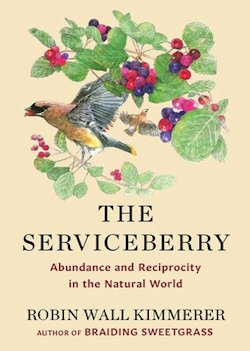SEJournal Online is the digital news magazine of the Society of Environmental Journalists. Learn more about SEJournal Online, including submission, subscription and advertising information.
 |
BookShelf: The Bounty of the Gift Economy
“The Serviceberry: Abundance and Reciprocity in the Natural World”
By Robin Wall Kimmerer
Scribner, $20.00
 |
Reviewed by Jennifer Weeks
“The Serviceberry: Abundance and Reciprocity in the Natural World” opens with the author, Indigenous botanist Robin Wall Kimmerer, picking ripe serviceberries from laden bushes, surrounded by songbirds who also are filling up on the fruit.
The plant supports many species wherever it grows. Deer and moose browse on it, butterflies visit its flowers and the berries are a key ingredient in pemmican and other Indigenous foods.
From this abundance, Kimmerer launches into her central point: Gift economies, centered on giving and re-giving, are all around us, and are a powerful counterpoint to market economies.
Hundreds of exchanges produced the fruit in her pail.
Kimmerer writes:
“The Maples who gave their leaves to the soil, the countless invertebrates and microbes who exchanged nutrients and energy to build the humus in which a Serviceberry seed could take root, the Cedar Waxwing who dropped the seed, the sun, the rain, the early spring flies who pollinated the flowers, the farmer who wielded the shovel to tenderly settle the seedlings. They are all parts of the gift exchange by which everyone gets what they need.”
You might buy a quart of berries at a market, but the exchange ends there. It’s a material transaction and you own the berries when it’s done. Receiving them as a gift, whether from a neighbor who grew them or got them directly from a wild bush, is different. You feel gratitude and connection with the source.
In her 2013 bestseller, “Braiding Sweetgrass: Indigenous Wisdom, Scientific Knowledge and the Teachings of Plants,” Kimmerer drew on her Potawatomi heritage, as well as her scientific training, to argue that ecological consciousness requires humans to understand and appreciate our reciprocal relationship with the rest of the living world.
Quiet challenge to capitalism
“The Serviceberry” explores what that kind of outlook would mean for economies. It’s a quiet challenge to today’s tech-driven capitalist moment.
“In a gift economy, wealth is understood as having enough to share, and the practice for dealing with abundance is to give it away,” Kimmerer explains. “In fact, status is determined not by how much one accumulates, but by how much one gives away. The currency in a gift economy is relationship, which is expressed as gratitude, as interdependence and the ongoing cycles of reciprocity. … The economic unit is ‘we,’ rather than ‘I,’ as all flourishing is mutual.”
Reading this, I thought of the final scene in the holiday classic, “It’s a Wonderful Life,” when citizens of Bedford Falls rally to save George Bailey from financial ruin and show him how much he means to them. Harry Bailey offers a toast to his brother, whom he calls “the richest man in town.”
Kimmerer describes how
gift economies are practiced
by Indigenous communities
around the world.
Kimmerer describes how gift economies are practiced by Indigenous communities around the world, in potlatches and modern tribal management of resources such as land and fisheries.
Gift economies also show up in other forms, such as Little Free Libraries, freecycling exchanges and roadside stands that give away extra vegetables. A lot of internet content is gifted. Think of open-source software, Wikipedia and how-to videos on YouTube.
At the same time, extractive capitalism is harming the world’s resources. Kimmerer acknowledges that “most of us are enmeshed in the market economy,” which is regulated by supply and demand, and bases objects’ value on their scarcity, not on their abundance.
But she also shows how gift economies can scale, at least to the community level. Think of public libraries, parks and culture programs. They’re tax-funded, not free, but based on the idea that they provide value for many people, not rationed by price.
Questioning the ‘tragedy of the commons’
Some economists are starting to question Garrett Hardin’s famous “Tragedy of the Commons” thesis that humans aren’t capable of sharing common property without overusing it.
Many Indigenous communities apply rules to managing resources so that no one overuses them. I witnessed a similar example of this at a cafe in Stockholm, where there was a small sign next to the napkin dispenser that stated, “Please take only as many as you need.”
‘What we crave is not trickle-down,
faceless profits but reciprocal,
face-to-face relationships.’
— Robin Wall Kimmerer
“I don’t think market capitalism is going to vanish,” Kimmerer wrote. “But I don’t think it’s pie in the sky to imagine that we can create incentives to nurture a gift economy that runs right alongside the market economy. After all, what we crave is not trickle-down, faceless profits but reciprocal, face-to-face relationships, .... reciprocal economies that serve community rather than undermine it.”
For example, why not buy “The Serviceberry” at an independent bookstore and then give it to another reader once you’ve finished it?
Jennifer Weeks, contributing editor to SEJournal, is a freelance editor and writer and a former board member of the Society of Environmental Journalists.
* From the weekly news magazine SEJournal Online, Vol. 10, No. 5. Content from each new issue of SEJournal Online is available to the public via the SEJournal Online main page. Subscribe to the e-newsletter here. And see past issues of the SEJournal archived here.












 Advertisement
Advertisement 



